2022-23 Departmental Results Report
Erratum
Footnote (*) for the Contracting performance indicators table was amended to remove reference to values including contracts or contracts amendments that were entered into with Indigenous businesses by means of acquisition cards.
Table of contents
- From the Minister
- From the President and CEO
- Results at a glance
- Results: what we achieved
- Spending and human resources
- Corporate information
- Supporting information on the program inventory
- Supplementary information tables
- Federal tax expenditures
- Organizational contact information
- Appendix: definitions
- Endnotes
From the Minister

The Honourable Dan Vandal
Minister of Northern Affairs, Minister responsible for Prairies Economic Development Canada, and Minister responsible for the Canadian Northern Economic Development Agency
Polar Knowledge Canada's 2022-23 Departmental Results Report provides Canadians and Parliamentarians an overview of this year's accomplishments and the work we do to advance Canada's knowledge of the Arctic, strengthen Canadian leadership in polar science and technology, and promote the development and distribution of knowledge of other circumpolar regions.
Polar Knowledge Canada operates the Canadian High Arctic Research Station in Cambridge Bay, Nunavut, a pillar for innovation, technology, and science in the Arctic. The Canadian High Arctic Research Station enables a wide range of interdisciplinary scientific research, environmental monitoring initiatives, baseline data collection, and piloting technology projects that have real world impacts for Canadians. This work is critical to building resilient communities in the Arctic, by enhancing economic opportunities, environmental stewardship, and the quality of life of Northerners.
Incorporating Indigenous knowledge and local knowledge with scientific knowledge has been crucial to developing and maintaining a sustainable approach to Canadian Arctic science and research. Polar Knowledge Canada operates with a strong focus on collaboration, enabling the organization to foster knowledge mobilization, outreach, and capacity-building activities for Northerners, bringing together scientists, researchers and knowledge holders with a special focus on empowering Indigenous youth. Providing Northern and Indigenous students with training and participation in Polar Knowledge Canada led or funded science and technology projects continues to be paramount to Polar Knowledge Canada's capacity-building efforts.
Polar Knowledge Canada also works in partnership with Indigenous organizations, governments, academic institutions, and other domestic and international research networks and, through a distinctions-based approach to setting research priorities, provides better solutions to ensure a vibrant, prosperous, and sustainable Arctic and northern region. These actions support a vision of a sustainable future guided by knowledge and collaboration, in which Northerners are thriving, strong and safe.
I am honoured to have Polar Knowledge Canada as part of my portfolio and pleased to provide this report on the work completed in the 2022-23 year.
The Honourable Dan Vandal, P.C., M.P.,
Minister of Northern Affairs, Minister Responsible for Prairies Economic Development Canada and Minister Responsible for the Canadian Northern Economic Development Agency
From the President and CEO
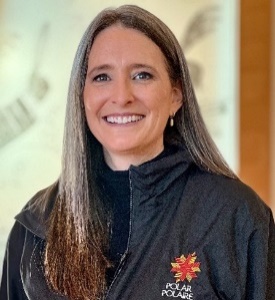
Jennifer C. Hubbard
President and CEO,
Polar Knowledge Canada
In 2022-23, Polar Knowledge Canada celebrated seven years of research and engagement activities to advance knowledge of the polar regions and strengthen Canadian leadership in polar science and technology. Since joining Polar Knowledge Canada as President and CEO in Fall 2020, I have observed how Canadian polar science and knowledge can promote better outcomes for Northerners, including how Indigenous youth play an integral role in the future of advancing Arctic research.
In 2022-23, Polar Knowledge Canada resumed operations, as global health restrictions began to lift. We learned tremendously from our experience during these challenging times and continue to strive for a thriving, strong and safe Canadian Arctic. Amid new global realities, we developed innovative and proactive approaches to building and maintaining meaningful relationships with Indigenous partners, conducting impressive research and science initiatives, and proved ourselves to be global leaders in polar science and research. I am proud to speak to the resilience of our strong communities, our passionate employees, and our dedicated collaborators, who have been an invaluable part of our success this year.
Polar Knowledge Canada proudly demonstrated the Canadian High Arctic Research Station's ability to be a global hub for Arctic science and research by funding and leading domestic and international initiatives and projects. Polar Knowledge Canada continued to create and foster collaboration opportunities with Northern communities, by including knowledge holders and incorporating Indigenous knowledge in its research projects and initiatives. This work was critical as the organization works towards its vision of "a sustainable future guided by knowledge and collaboration."
Polar Knowledge Canada served Northern communities by building and maintaining strong, lasting, and meaningful relationships with Indigenous partners that are rooted in collaboration, respect, integrity, and co-development in every aspect of our work. We showed that we were attentive to issues that matter to Northern communities, including wildlife health, ecosystem biodiversity and climate change.
Polar Knowledge Canada will continue to provide leadership in the Arctic through the creation and mobilization of polar science and technology, northern engagement, and by addressing the challenges of our dynamic polar regions.
I am pleased to present Polar Knowledge Canada's 2022-23 Departmental Results Report.
Jennifer C. Hubbard
President and CEO, Polar Knowledge Canada
Results at a glance
Mission alignment and direction
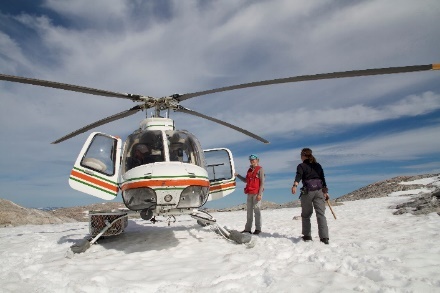
A helicopter used for geology research, near Iqaluit, Nunavut
Polar Knowledge Canada's mission-aligned initiatives, in line with the Government of Canada's priorities, focused on sustainable Arctic research, Indigenous partnerships, and knowledge sharing. Through enhanced program delivery, infrastructure upgrades, and innovative scientific research, Polar Knowledge Canada strengthened research capabilities, supported Northern communities, and promoted environmental stewardship. Its commitment to knowledge mobilization, youth engagement, and international collaborations contributed greatly to strengthening Canada's leadership in polar science and technology.
Program delivery and infrastructure
Polar Knowledge Canada enhanced program delivery, particularly through collaborations with universities, and other Government of Canada and Territorial departments, to expand research opportunities and disseminate scientific knowledge. It invested in modernizing equipment and infrastructure, ensuring researchers have access to state-of-the-art resources and a safe and conducive work environment. In addition, Polar Knowledge Canada undertook a comprehensive review of its internal processes, implementing strategic improvements to enhance program delivery and optimize its research initiatives. Polar Knowledge Canada also demonstrated commitment to leadership in polar research and commitment to advancing knowledge in the high Arctic regions, by assuming custodianship of the Canadian High Arctic Research Station. These efforts strengthened research capabilities and fostered multidisciplinary and international exploration within the polar science community, and other circumpolar regions, including Antarctica.
Partnerships and collaboration
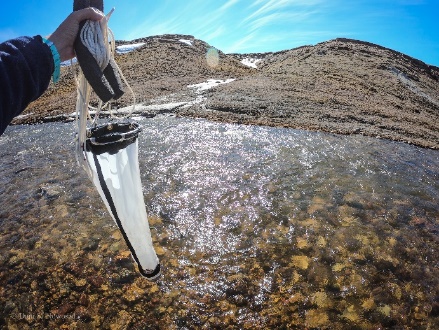
Deploying of a Zooplankton net, Nunavut
Polar Knowledge Canada prioritized sustainable Arctic research, to improve knowledge of ecosystems, community wellness, and energy solutions in the North and Arctic. Through Memoranda of Understanding with Inuit Tapiriit Kanatami and the Gwich'in Tribal Council, the agency advanced work objectives around research governance, clean energy initiatives, and knowledge sharing. These partnerships fostered Indigenous representation, engagement, and local knowledge. Polar Knowledge Canada actively participated in international scientific and technical bodies, such as the International Arctic Science Committee and the Council of Managers for National Antarctic Programs, to help advance Canada's position in polar research. Contributions to drafting the Scientific Committee on Antarctic Research Strategic Plan 2023-2028 demonstrated Canada's commitment to advancing research and science in both polar regions.
Knowledge mobilization and engagement
Polar Knowledge Canada prioritized knowledge mobilization through reports, webinars, and speaker series, sharing polar knowledge to the research community and beyond. These initiatives promoted research excellence, Indigenous knowledge mobilization, and while engaging with various partners to increase northern and Arctic to increase northern research leadership. It launched co-developed calls for proposals with the Government of the Northwest Territories to target knowledge gaps on Barren Ground caribou, and with a Yukon steering committee around climate adaptation strategies. Additionally, Polar Knowledge Canada supported Northern and Arctic communities through initiatives such as wildlife monitoring, and clean energy projects. It engaged youth through workshops, international learning opportunities, and awareness campaigns. These efforts aimed to empower Indigenous knowledge holders, foster new and existing partnerships, and promote environmental stewardship among Arctic and Northern youth.
Training and capacity building
Polar Knowledge Canada awarded scholarships to early career researchers and supporting research on diverse topics, including the Antarctic Ice Sheet and impacts of climate change in the North and Arctic. Polar Knowledge Canada launched a new fellowship program to help strengthen northern-based research, by supporting post-doctoral and visiting research fellows. The Canadian High Arctic Research Station hosted the 2022 Youth Science Career Awareness Camp where youth were introduced through hands-on interactive sessions to wildlife research, robotics, transportation design, software coding, and monitoring of water quality and its impact on arctic marine life.
Science and technology
Polar Knowledge Canada achieved significant milestones in its research efforts, advancing Canada and the world's understanding of the polar regions and its importance for our planet. Through collaborative initiatives, Inuit polar bear experts have provided valuable insights into the health and abundance of polar bears, essential for wildlife management planning. The use of DNA barcoding has paved the way for detecting invasive species, while studies on lemmings have revealed the impact of climate change on their survival. Projects funded within Canada - Inuit Nunangat - United Kingdom Research Programme are working to understand changing arctic ecosystems and the impact of these changes on Inuit health and well-being. These are just a few examples of the innovative research undertaken, showcasing Polar Knowledge Canada's dedication to expanding our knowledge of the polar regions and its significance for the planet.
Message to Canadians
As we conclude this glimpse into this year's activities of Polar Knowledge Canada, we invite you to take a dive into the pages ahead to uncover the remarkable initiatives, groundbreaking research, collaborative partnerships, and results that drive us forward. Explore the transformative power of sustainable Arctic research, the significance of Indigenous partnerships, and the knowledge that is reshaping our understanding of the polar regions.
For more information on Polar Knowledge Canada's plans, priorities and results achieved, see the Results: what we achieved section of this report.
Results: what we achieved
Core responsibilities
Polar Science and Knowledge
Description
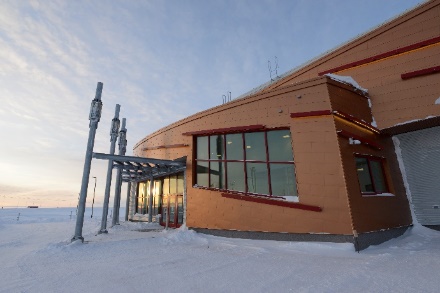
The Canadian High Arctic Research Station Main Research Building
Polar Knowledge Canada is Canada's polar science agency operating out of the world-class Canadian High Arctic Research Station campus in Cambridge Bay, Nunavut. Polar Knowledge Canada performs and publishes multi-disciplinary polar research. Through our grants and contributions program, we fund external partners in academia, northern and Arctic communities and organizations who conduct research and related projects. Polar Knowledge Canada aims to include Indigenous and local knowledge wherever possible and increase domestic and international research coordination and collaboration by leveraging resources with partners. Through workshops, conferences, social media, and other tools, Polar Knowledge Canada shares and promotes the exchange of knowledge across polar scientific and policy communities and the public. Throughout all its core activities, Polar Knowledge Canada aims to fund and train the next generation of polar research personnel, with a focus on northern and Indigenous youth.
Results
The following is a summary of the key activities associated with Polar Knowledge Canada's Results Framework:
Canada's polar science and technology research is publicly available and being applied
The polar science and technology research that is performed at the Canadian High Arctic Research Station campus will be publicly available and shared within Canada and internationally through a wide range of publications, events, meetings and other means.

The Right Honourable Justin Trudeau, the North Atlantic Treaty Organization's Secretary General Jens Stoltenberg, and Minister of Northern Affairs, the Honourable Dan Vandal led a ministerial delegation at the Canadian High Arctic Research Station
Throughout the year 2022-23, Polar Knowledge Canada made significant strides in mobilizing and disseminating polar science and technology research findings and products. By leveraging various channels such as its website, webinars, meetings, and more, the agency communicated its research findings and engaged with stakeholders and Indigenous partners. In line with its commitment to knowledge creation, knowledge mobilization, and northern engagement, Polar Knowledge Canada achieved the following results:
Results:
- In 2022-23, Polar Knowledge Canada exceeded the performance indicator target for the percentage of research publications led or supported by Polar Knowledge Canada that are available online to the Canadian public. With a target of at least 30%, 45% of research publications were led or supported by Polar Knowledge Canada that are available online to the Canadian public.
- Additionally, Polar Knowledge Canada exceeded the performance indicator target for the number of citations of research led or supported by Polar Knowledge Canada. With a target of at least 100, there was a total of 188 citations of research that were led or supported by Polar Knowledge Canada.
- In 2022-23, Polar Knowledge Canada enhanced and communicated polar science and technology through its website, webinars, meetings, alongside other means. As part of its knowledge creation, knowledge mobilization and northern engagement results, Polar Knowledge Canada:
- Published reports on various scientific research topics, including research on the use of DNA to track invasive species in the Arctic, climate change and food security in the North, and a collaborative study on the health and abundance of polar bears.
- Developed and advanced targeted communication on Avian Influenza to northern and Arctic communities in collaboration with the Government of Nunavut, Environment and Climate Change Canada, Indigenous Services Canada, the Canadian Food Inspection Agency, and the Public Health Agency of Canada.
- Conducted a series of six webinars and published the Aqhaliat Report - volume 4bringing together researchers and Indigenous knowledge holders to share information on issues that Northern and Arctic communities are most concerned about, which include caribou abundance, Arctic char populations, whales and marine ecosystem biodiversity, climate change research, and changes in snow, ice, and precipitation.
- Organized a weekly speaker series at the Canadian High Arctic Research Station featuring visiting scientists, local experts participating in research, and Polar Knowledge Canada staff. Here, speakers shared knowledge with the public while highlighting how they collaborate with the Northern community and incorporate Inuit knowledge in their research.
- Hosted the Right Honourable Justin Trudeau, the North Atlantic Treaty Organization's Secretary General, Jens Stoltenberg, the Minister of Northern Affairs, the Honourable Dan Vandal, as well as the Ministers of Foreign Affairs, and Defence, the Deputy Premier of Nunavut, the Chief of the Defence Staff, and the Canadian ambassador to NATO at the Canadian High Arctic Research Station. The delegation was invited to meet with local elders and Inuit leaders and learn about Polar Knowledge Canada's work.
- Welcomed the Senate Standing Committee on National Security and Defence to the Canadian High Arctic Research Station to meet the Committee in support of its work for its study of: "The Arctic is ill-defended against foreign, domestic, and environmental threats: Senate report".
Canada's Arctic science includes Indigenous and local knowledge
POLAR will ensure that Indigenous and local knowledge is incorporated into the research that it performs and funds and will provide opportunities to advance Inuit employment and training in science, policy and administrative positions which will support Polar Knowledge Canada in meeting the Government of Canada's Inuit employment obligations under Article 23 of the Nunavut Agreement.
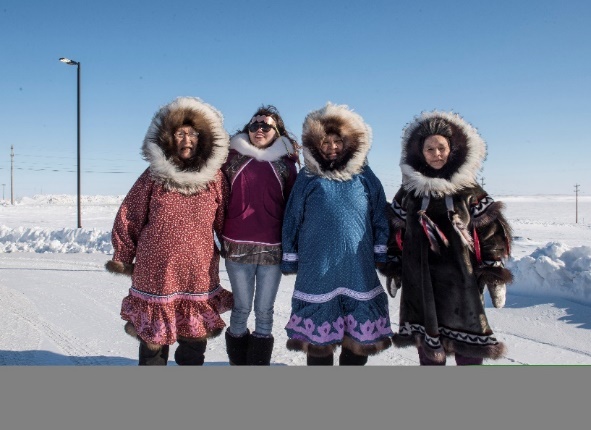
Local Cambridge Bay residents
In 2022-23, POLAR continued to prioritize the inclusion of Indigenous knowledge and local knowledge in its projects, fostering representation of Inuit employees and Inuit voices. Conducted research whilst consistently engaging with Indigenous knowledge holders, ensuring comprehensive and relevant research.
Results:
- In 2022-23, Polar Knowledge Canada did not exceed the performance indicator target for the percentage of Arctic research projects led or supported by Polar Knowledge Canada that include Indigenous or local knowledge. With a target of at least 90%, 82% Arctic research projects led or supported by Polar Knowledge Canada included indigenous knowledge or local knowledge.
- Additionally, Polar Knowledge Canada did not exceed the performance indicator target for Percentage of Arctic projects led or supported by Polar Knowledge Canada that involve Northerners. With a target of at least 90%, 78% led or supported by Polar Knowledge Canada involved Northerners.
- In 2022-23, Polar Knowledge Canada successfully incorporated Inuit knowledge in its work, including in a new collaborative ground-breaking study on the health and abundance of polar bears. Polar Knowledge Canada worked alongside the Hunters and Trappers Organizations from Pangnirtung and Kimmirut, the Government of Nunavut, and Environment and Climate Change Canada to produce a comprehensive assessment of the health of the polar bears of the Davis Strait population from the perspective of 35 Inuit polar bear experts.
- Polar Knowledge Canada advanced its Inuit Employment Plan towards ensuring the representation of Nunavut-based Inuit in Polar Knowledge Canada's workforce. Nunavut Inuit represent 43% of Nunavut-based positions with a significant increase in Inuit in managerial and executive positions.
- Work began for a cohort of 13 Arctic research projects under the Canada-Inuit Nunagat-United Kingdom Arctic Research Programme 2021-25. These projects cover a wide range of important areas, including shipping, wildlife health, country foods, ecosystem health, search and rescue, renewable energy, community health, coastal erosion, plastics and pollution, and much more.
- Polar Knowledge Canada worked with the Hunters and Trappers Organizations from the Inuvialuit and Kitikmeot Regions, local conservation officers, university partners and the Canadian Wildlife Health Cooperative to host a workshop on wildlife health and disease. At the Canadian High Arctic Research Station, participants learned about wildlife health and disease investigations, discussed common wildlife diseases, and participated in hands on activities on parasite analysis of muskox fecal samples and necropsies of foxes, wolves, and wolverines.
- Polar Knowledge Canada co-developed an innovative Nunavut One Health Learning Circle with Inuit treaty organisation Nunavut Tunngavik Inc, supporting system-building at the intersection of wildlife and human health in Nunavut. This forum included 23 experts from the Government of Nunavut, Nunavut Research Institute, the Nunavut Wildlife Management Board, the Canadian Wildlife Health Cooperative, and Nunavut Tunngavik Inc. This approach reflects Polar Knowledge Canada's commitment to implementing the Government of Canada's Inuit Nunangat Policy, and Inuit-Crown Co-development Principles.
Canada fosters domestic and international knowledge exchange and partnerships in polar science and technology
Operating and maintaining the Canadian High Arctic Research Station campus as a world-class centre for polar science will allow Polar Knowledge Canada to strengthen and expand national and international research collaborations and, in turn, gain knowledge and expertise to address regional and circumpolar challenges.
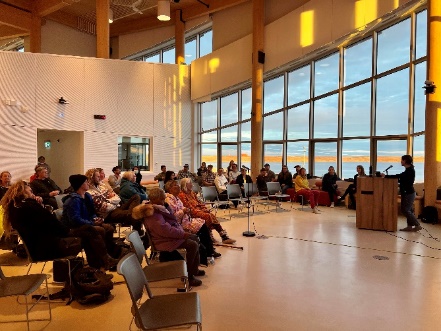
Speaker Series at the Canadian High Arctic Research Station
In 2022-23, Polar Knowledge Canada continued to strengthen partnerships for collaboration and exchange with researchers, Indigenous organizations, provincial and territorial partners, and other federal departments to promote government priorities. Polar Knowledge Canada expanded its attendance to new committees, councils, and assemblies for important priorities, like climate change, that are important to Canadians and even more so to northern and Arctic communities. Polar Knowledge Canada has continued to foster relationships with domestic and international partners to further our scientific understanding of the North and Arctic and address regional and circumpolar challenges.
Results:
- In 2022-23, Polar Knowledge Canada exceeded the performance indicator target for the number of knowledge exchange activities let or supported by Polar Knowledge Canada. With a target of 100, there were 716 knowledge exchange activities or initiatives led or supported by Polar Knowledge Canada.
- Additionally, Polar Knowledge Canada exceeded the performance indicator target for the percentage of leveraged investment by Polar Knowledge Canada supported projects. With a target of 100%, an investment of 104% was leveraged by Polar Knowledge Canada supported projects, thereby strengthening Canada's leadership in polar science and technology with every dollar invested through Polar Knowledge Canada's transfer payment agreements with an additional $1.04 from other sources to advance priority research.
- Also, Polar Knowledge Canada exceeded the performance indicator target for the percentage of projects led by Polar Knowledge Canada that involve external partners. With a target of 75%, approximately 81% of projects led by Polar Knowledge Canada involved participation from external partners.
- Polar Knowledge Canada strengthened its polar science partnerships internationally through active participation in diverse organizations, such as, the Council of Managers of National Antarctic Programs, UArctic, and the Arctic Circle Assembly.
- The Arctic Remote Energy Networks Academy, a collaboration with Gwich'in Council International, connected community energy champions with domestic and international counterparts in Alaska, Greenland, Iceland, and Canada, to develop energy champions for remote communities.
- Polar Knowledge Canada successfully collaborated with the Government of the Northwest Territories to offer $850,000 in new funding for caribou research. The agency also assembled a regional steering committee to define and launch a Yukon call for proposals.
- Domestically, Polar Knowledge Canada collaborated with several federal agencies, including National Research Council and Natural Resources Canada, to advance clean technology projects that meet mutual northern mandates. These projects include production of biofuels from food waste, bioelectrical anaerobic sewage treatment, testing and demonstrating off-grid wind turbines, production of hydrogen from wastewater from reverse osmosis systems and the potential to operate community freezers exclusively from renewable energy.
- Through its Research Support program, Polar Knowledge Canada hosted and provided in-kind research support at the Canadian High Arctic Research Station to nearly 600 guests from Canada and across the globe, equating to 4718 cumulative days of arctic research.
The next generation of Canadian polar researchers is developed
Polar Knowledge Canada's Grants and Contributions program and the Canadian High Arctic Research Station campus will continue to support students in technical, science and research programs at colleges and universities. Polar Knowledge Canada has specific initiatives delivered via the Canadian High Arctic Research Station campus to encourage youth engagement, including science camps for local youth, summer employment, casual hires, and student placements. Polar Knowledge Canada also has early-career researcher exchange programs to build a base of early career polar researchers.

Polar Knowledge Canada field technician Angulalik Pedersen
For 2022-23, Polar Knowledge Canada continued to promote interest in polar science and technology opportunities by providing support to external partners for projects, and capacity-building initiatives for early career researchers. Polar Knowledge Canada also continued to develop youth interest in polar science, research and technology through programming, engaging youth in science-based activities, and collaborating with partners on youth-targeted activities. Polar Knowledge Canada was successful in supporting research initiatives within Canadian post-secondary institutions and promoting science education opportunities for Northern students.
Results:
- In 2022-23, Polar Knowledge Canada did not exceed the performance indicator target for the percentage of Polar Knowledge Canada-led or supported projects that involve youth or early career researchers. With a target of 80%, only 57% of Polar Knowledge Canada-led or supported projects involved youth or early career researchers.
- Polar Knowledge Canada launched a new fellowship program to help strengthen northern-based research. The Polar Knowledge Canada Fellowship Program supports post-doctoral and visiting research fellows at a northern institution, whose work aligns with Polar Knowledge Canada's Science and Technology goals in the 2023-24 fiscal year.
- Polar Knowledge Canada provided a total of $920,000 in grants to 279 students at 36 universities through the Northern Scientific Training Program. The Northern Scientific Training Program provides funding to encourage Canadian universities to train northern specialists.
- Polar Knowledge Canada honoured and supported the next generation of polar researchers with a suite of awards and scholarships for outstanding university students in polar studies. Deserving students were presented with the Polar Knowledge Canada Scholarship, the Polar Knowledge Canada Northern Resident Scholarship, the Polar Knowledge Canada Northern Resident Award, the Polar Knowledge Canada Antarctic Scholarship, and the Northern Scientific Training Program Special Awards.
- Polar Knowledge Canada, in collaboration with the Makigiaqta Inuit Training Corporation, the Nunavut Wildlife and Management Board, MakerSpace, Shad Canada, and the Recreation and Parks Association of Nunavut inspired a new generation of youth through the 2022 Youth Science Career Awareness Camp. Young people attended hands-on interactive sessions on wildlife research, robotics, transportation design, software coding, and monitoring of water quality and its impact on Arctic marine life.
Gender-based analysis plus

Field technician Aili Pederson putting on her scuba diving gear as part of a diving exercise with the Polar Knowledge Canada diving team.
Polar Knowledge Canada takes into account all Gender-Based Analysis Plus lenses in its policy and decision-making and prioritizes an approach that specifically focuses on Inuit to support its mandate as a Northern organization operating in Nunavut. This commitment aligns with commitments under Article 23 of the Nunavut Agreement and Polar Knowledge Canada's mandate, which emphasizes the organization's responsibility to engage and support Indigenous communities in its research and knowledge mobilization activities. Polar Knowledge Canada aims to address the unique needs, opportunities, and aspirations of the labour force in the Arctic region and promote equitable outcomes for Northerners with a particular focus on reducing barriers to entry into science-based positions. Additionally, Gender-Based Analysis Plus continues to support improvements in both programs and its internal services and operations.
Gender and Inuit Employment
Nunavut Inuit occupied 43% of the encumbered positions at the Canadian High Arctic Research Station, demonstrating a continued increase to representation. Furthermore, women accounted for 69% of Inuit employees at the Canadian High Arctic Research Station.
Inuit Representation by Age and Job Levels
Inuit staff at Polar Knowledge Canada are predominantly young, and in recent years, they have been increasingly occupying entry- and mid-intermediate level positions, as well as senior level positions, in Cambridge Bay, Nunavut. Currently, administrative roles at the Canadian High Arctic Research Station are entirely occupied by Inuit employees. Additionally, 44% of Inuit employees at the Canadian High Arctic Research Station hold positions higher than entry-level, indicating advancement within the organization. This increase supports Polar Knowledge Canada's commitment to increasing opportunities for professional development, upward mobility and reducing barriers for entry into the workforce for Nunavut Inuit.
Inuit Representation in Technical and Operational Roles
The continued implementation of the Inuit Employment Plan has led to increasing representation of Nunavut Inuit in technical and operational roles at the Canadian High Arctic Research Station. Currently, Nunavut Inuit represent 50% of the workforce in these crucial positions. An achievement which highlights the commitment to diversity and inclusion within technical and operational roles, ensuring equitable opportunities for Inuit.
Inuit Representation in Management
Efforts to enhance Inuit representation in management positions have also shown progress. Currently, 33% of Nunavut-based management positions are occupied by Inuit employees, indicating a growing representation of Inuit in leadership roles within the organization.
Supporting Inuit Education
Polar Knowledge Canada is actively supporting Inuit employees in pursuing post-secondary education and career advancement, through initiatives such as the Pilimmaksaivik Education Support Fund. Initiatives like this are crucial in building the capacity of Inuit and will contribute to increasing representation in mid-level and senior roles at Polar Knowledge Canada and within the broader Government of Canada in the years to come.
United Nations 2030 Agenda for Sustainable Development and the Sustainable Development Goals
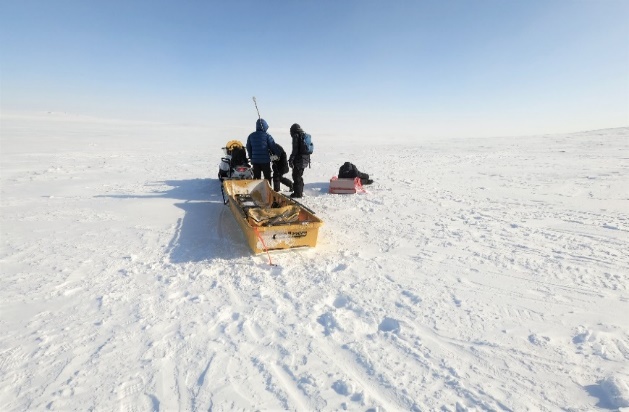
Team of researchers with a snowmobile near Cambridge Bay, Nunavut
Polar Knowledge Canada supported Canada's efforts to implement the United Nations' 2030 Agenda for Sustainable Development by contributing to several of its Sustainable Development Goals. In line with the vision set out by Canada's 2030 Agenda National Strategy, Polar Knowledge Canada recognizes that integrating these goals into its own work brings us a step closer towards improved sustainability, peace, inclusivity, and prosperity across Canada and the North and Arctic. Polar Knowledge Canada, recognizing the significance of its mandate and the initiatives it undertakes, the agency intends to report on three of the Sustainable Development Goals.
Goal 4 - Promote knowledge and skills for sustainable development
Polar Knowledge Canada provided knowledge-sharing and research opportunities to Canadians, international collaborators and for Northern communities through grants and contributions, scholarships, and programs. Polar Knowledge Canada's knowledge-exchange opportunities included collaborative studies conducted alongside Northerners and Inuit; webinars which brought together researchers and Indigenous knowledge-holders; as well as weekly speakers' series which permitted knowledge-exchange between visiting scientists, local experts, and Polar Knowledge Canada Staff. In addition, Polar Knowledge Canada's contributions to research-support included the funding of $920,000 in grants to 279 students at 36 universities through the Northern Scientific Training Program; the launching of a new fellowship program supporting researchers at Northern institutions; and the distribution of a suite of awards and scholarships for outstanding university students in Polar Knowledge Canada studies. Beyond this, Polar Knowledge Canada promoted skills-development through intramural research projects, community outreach and engagement and knowledge management and mobilization activities. To develop skills among the next generation of researchers, Polar Knowledge Canada hosted a Youth Science Career Awareness Camp, where it engaged with Northern youth and provided them with hands-on experimenting opportunities. Together, these efforts contributed to increase access to employment, and in turn economic growth, sustainable communities, and improved infrastructure.
Goal 10 - Advance reconciliation with Indigenous Peoples
Polar Knowledge Canada continued its efforts in implementing and respecting our commitments in respect to the Inuit Employment Plan, which aims to increase Inuit representation at the Canadian High Arctic Research Station. In accordance with Article 23 of the Nunavut Agreement, this Plan aims to increase Inuit employment in government to a representative level within all occupational groups and levels in Nunavut. In fact, Nunavut Inuit represent 43% of Polar Knowledge Canada's Nunavut based positions. Specifically, Inuit represent 47% of entry-level positions and 44% of Inuit employees at the Canadian High Arctic Research Station hold positions higher than entry-level. The agency also actively engages with Indigenous knowledge holders and stakeholders to fulfill its mandate and include Indigenous perspectives in its polar science initiatives. The agency goes beyond its mandated requirements by providing priority contracting to local Indigenous companies and striving to enhance business opportunities for Indigenous Peoples. This commitment is evident in the agency's achievement of attributing 25% of its procurement to Indigenous suppliers, surpassing the Phase 1 department's minimum target of 5%.
Goal 13 - Take urgent action to combat climate change and its impacts
Polar Knowledge Canada conducted research to advance clean energy, technology, and infrastructure solutions for remote northern and Arctic communities by facilitating the development and testing of energy, housing, water, and waste treatment technologies suitable for the unique environmental and socio-cultural conditions in the North and Arctic. In fact, Polar Knowledge Canada collaborated with the National Research Council and Natural Resources Canada, on many clean energy projects to prioritize a move away from a dependence on fossil fuels in the North and Arctic. Polar Knowledge Canada's clean energy team is developing and testing clean technologies to see how they handle the environmental, logistical and cultural challenges of Canada's remote northern and Arctic communities. These include testing and demonstrating a wind turbine in the Arctic, producing biofuels from food waste in an Arctic and northern community, developing energy champions for remote communities, and producing energy from human waste. Additionally, Polar Knowledge Canada was part of the Canadian delegation, led by Global Affairs Canada and Environment and Climate Change Canada, supporting the effort to become a full Consultative Party to the Antarctic Treaty. Environmental conditions in the Antarctic influence global ocean and climate systems, and international collaboration plays an invaluable role in understanding and safeguarding the intrinsic value of the Earth's polar regions and consequently the planetary impacts of climate change. Polar Knowledge Canada has taken important steps in being a Canadian champion for climate change, especially in the North and Arctic, where the effects of these changes are first felt. Additionally, Polar Knowledge Canada supports the Greening Government goal reinforcing Green Procurement strategies and policies by using environmental criteria to reduce the environmental impact and ensure best value in government procurement decisions. Consequently, Polar Knowledge Canada relied on common use procurement instruments which include environmental considerations, where available and feasible. Moreover, Polar Knowledge Canada's contracting templates were reviewed to integrate environmental considerations into procurement management processes and controls. By joining councils, assemblies, partnering with important stakeholders, and incorporating environmental considerations in its procurement, Polar Knowledge Canada has played an instrumental role in influencing positive change towards preserving our planet, minimizing climate impacts on northerners and Indigenous Peoples, and crafting the ways of tomorrow.
Innovation
Polar Knowledge Canada has implemented several key high-impact innovations in relation to polar science and knowledge. The following innovations highlight the advancements made:
Efforts to evaluate and modernize Transfer Payment Programs: Polar Knowledge Canada embraced innovation by acknowledging the distinct challenges of the Northern and Arctic region and the need for adaptation. In pursuit of this goal, the agency conducted a program evaluation in collaboration with external northern and Arctic stakeholders, Indigenous partners subject matter experts. This inclusive approach facilitated valuable input from consultants and the local community, enabling the alignment of Transfer Payment Programs with the specific needs of its recipients.
Modernizing Corporate Practices: Polar Knowledge Canada, with an eye on the future, continues to modernize corporate practices. To achieve this, Polar Knowledge Canada has implemented corporate best practices, which includes enhancing financial management, human resources, procurement, infrastructure, and asset management, ensuring not only responsible and efficient use of funds, improving the stewardship of public resources, but also targeted and effective program delivery in a Northern and Arctic context.
Innovative ways of operating in the North: Polar Knowledge Canada explored and implemented various technological solutions to enhance connectivity and collaboration. This included deploying a telepresence robot, known as the "Stretch," to facilitate remote presence for technicians at distant sites. Internal telecommunications were also improved to support effective communication and collaboration among teams. Furthermore, processes were established to support education, maintenance, and training, ensuring a well-rounded approach to operations.
Key risks
Polar Knowledge Canada operates in a complex and dynamic environment where various risks can impact its ability to carry out polar science and knowledge activities effectively. These risks span different areas, including operational, relationship and reputational, social-economic, and geopolitical risks. In this context, Polar Knowledge Canada has implemented innovative approaches and strategies to mitigate these risks and ensure the successful implementation of its initiatives and activities.
Operational risks - Polar Knowledge Canada faces several operational risks that may impact its ability to carry out activities effectively. These operational risks consist of:
- Housing availability: In remote areas, the availability of housing makes it difficult to accommodate staff and researchers involved in various projects. This shortage of housing options can hamper operational efficiency and inhibit the organization's capacity to expand its activities.
- Staffing qualified talent in remote communities: Remote areas often have limited access to qualified professionals, making it challenging to attract and retain talent. The remoteness of these communities can deter individuals from relocating, posing obstacles to the recruitment of personnel for important roles. Once talent is recruited, retaining skilled employees becomes even more challenging in remote locations where alternative career prospects may be attractive to candidates.
- Procurement: Shipping products to the northern regions is costly, and certain goods may not always be readily available. This scarcity and high transportation costs can adversely impact project timelines and resource allocation. Service providers in the northern regions are often scarce or require costly travel arrangements including sea and airlift.
- Remoteness: The vast distances and remoteness of the arctic regions increase the costs associated with community engagement and project implementation.
Polar Knowledge Canada has mitigated these operational risks by:
- exploring alternative housing options;
- implementing talent retention strategies;
- careful planning, and fostering partnerships for cost-effective procurement; and
- seeking addition baseline funding to support the operational realities of Arctic operations.
Relationships and reputational risks – Much of the agency's operations and planned activities rely on collaboration and partnerships with other federal organizations, northern and Indigenous organizations and communities, and academia. These relationships include specific obligations outlined in treaties and agreements; signed memoranda of understanding with Indigenous organizations; service agreements with other federal organizations; and others. These relationship and reputational risks include:
- Incomplete planned activities: Polar Knowledge Canada may be unable to complete planned activities due to internal capacity challenges or dependency on inputs from other organizations.
- Unfulfilled commitments: After taking over the custodianship of Canadian High Arctic Research Station, Polar Knowledge Canada may be unable to fully operationalize the research station without adequate long-term funding. Important partners and stakeholders, particularly Indigenous organizations and communities, may perceive delays as unfulfilled commitments.
Polar Knowledge Canada has mitigated these relationships and reputational risks by:
- involving and supporting community participation early, and in every stage of projects;
- northern engagement initiatives;
- using memoranda of understanding to communicate commitments with Indigenous partners and taking meaningful action to implement these commitments;
- developing a multi-year Real Property Strategy, and defining and seeking long-term baseline funding to fully operationalize the Canadian High Arctic Research Station's infrastructure; and
- addressing internal capacity challenges through timely recruitment including the ongoing implementation of its Inuit Employment Plan to attract, develop and retain talent.
Results achieved
The following table shows, for Polar Science and Knowledge, the results achieved, the performance indicators, the targets, and the target dates for 2022–23, and the actual results for the three most recent fiscal years for which actual results are available.
| Departmental results | Performance indicators | Target | Date to achieve target | 2020–21 actual results | 2021–22 actual results | 2022–23 actual results |
|---|---|---|---|---|---|---|
| Canada's polar science and technology research is publicly available and being applied | Percentage of research publications led or supported by Polar Knowledge Canada that are available online to the Canadian public | At least 30% | March 2025 | 60% | 83% | 45% |
| Number of citations of research led or supported by Polar Knowledge Canada | At least 100 | March 2025 | 439 | 91 | 188 | |
| Canada's Arctic science includes Indigenous and local knowledge | Percentage of Arctic research projects led or supported by Polar Knowledge Canada that include Indigenous or local knowledge | At least 90% | March 2025 | 94% | 47% | 81% |
| Percentage of Arctic projects led or supported by Polar Knowledge Canada that involve Northerners | At least 90% | March 2025 | 100% | 69% | 78% | |
| Canada fosters domestic and international knowledge exchange and partnerships in polar science | Number of knowledge exchange activities or initiatives led or supported by Polar Knowledge Canada | At least 100 | March 2025 | 344 | 217 | 716 |
| Percentage of leveraged investment by Polar Knowledge Canada- supported projects | At least 100% | March 2025 | 48% | 66% | 103% | |
| Percentage of projects led by Polar Knowledge Canada that involve external partners | At least 75% | March 2025 | 60% | 45% | 81% | |
| The next generation of Canadian polar researchers is developed | Percentage of Polar Knowledge Canada-led or supported projects that involve youth or early career researchers | At least 80% | March 2025 | 100% | 62% | 62% |
Financial, human resources and performance information for Polar Knowledge Canada's program inventory is available in GC InfoBase.i
Budgetary financial resources (dollars)
The following table shows, for Polar Science and Knowledge, budgetary spending for 2022–23, as well as actual spending for that year.
| 2022–23 Main Estimates | 2022–23 planned spending | 2022–23 total authorities available for use | 2022–23 actual spending (authorities used) | 2022–23 difference (actual spending minus planned spending) |
|---|---|---|---|---|
| 16,920,422 | 16,920,422 | 17,357,853 | 15,615,192 | 1,742,661 |
The variance of $1.7 million between the projected and realized expenditures in the fiscal year 2022-23 can be primarily attributed to procurement delays and disruptions in the global supply chain.
Financial, human resources and performance information for Polar Knowledge Canada's program inventory is available in GC InfoBase.ii
Human resources (full-time equivalents)
The following table shows, in full-time equivalents, the human resources the department needed to fulfill this core responsibility for 2022–23.
| 2022–23 planned full-time equivalents | 2022–23 actual full-time equivalents | 2022–23 difference (actual full-time equivalents minus planned full-time equivalents) |
|---|---|---|
| 44 | 40 | (4) |
The recruitment and retention of employees in the North presents unique challenges. The availability of qualified candidates in specialized fields, such as science and technology, limits the ability to recruit. The agency is developing comprehensive recruitment strategies, including several staffing processes, targeted outreach, and partnerships with educational institutions to support the development of local talent pools.
Financial, human resources and performance information for Polar Knowledge Canada's program inventory is available in GC InfoBase.iii
Internal services
Description
Internal services are those groups of related activities and resources that the federal government considers to be services in support of programs and/or required to meet corporate obligations of an organization. Internal services refers to the activities and resources of the 10 distinct service categories that support program delivery in the organization, regardless of the internal services delivery model in a department. The 10 service categories are:
- acquisition management services
- communication services
- financial management services
- human resources management services
- information management services
- information technology services
- legal services
- material management services
- management and oversight services
- real property management services
In fiscal year 2022-23, Polar Knowledge Canada successfully completed several key internal services initiatives. These include the finalization of the transfer of custodianship of the Canadian High Arctic Research Station and its related assets to Polar Knowledge Canada, the continued implementation of the agency's Inuit Employment Plan, and the completion of an evaluation of its transfer payment programs.
Transfer of Custodianship
Polar Knowledge Canada, in accordance with the Canadian High Arctic Research Station Act, has the responsibility of managing the infrastructure of the Canadian High Arctic Research Station. The approval for the custodianship transfer was a crucial step in fulfilling this mandate. The organisation is actively developing and implementing its Real Property Building Management Framework to ensure effective management of infrastructure assets over the next five years. With custodianship, Polar Knowledge Canada is expanding its internal administrative capacity and is actively exploring avenues for enhanced collaboration.
Evaluation of transfer payment programs
Polar Knowledge Canada has successfully completed an evaluation of its transfer payment programs, ensuring their relevance, effectiveness, and efficiency in achieving the agency's departmental results framework. The evaluation demonstrates that grants and contributions play a crucial role in developing the experience and expertise of students, emerging researchers, and members of Northern communities. Projects funded by Polar Knowledge Canada have significant impacts on ecosystems and communities, providing scientific knowledge and contributing to local decision-making on infrastructure, transportation, safety, and health. The evaluation highlights that without Polar Knowledge Canada funding, many projects would not have been possible or would have been limited in scale. The findings suggest areas for improvement, such as enhancing linkages between internal research and funded projects, continuing joint proposal calls, and disseminating results from previous projects. Engaging with Indigenous partners and organizations is identified as important to understand their needs and showcase the funded initiatives. Overall, the evaluation underscores the alignment of Polar Knowledge Canada's funded projects with the purpose of advancing and spreading knowledge about the Arctic.
Contracts awarded to Indigenous businesses
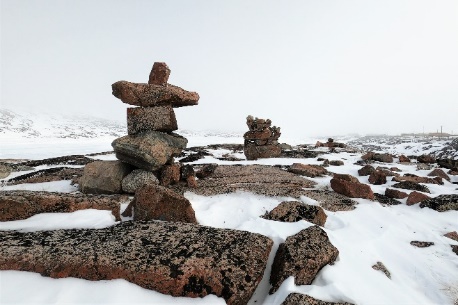
Inukshuk near Kugaaruk, Nunavut
Polar Knowledge Canada is a Phase 1 department and as such must ensure that a minimum 5% of the total value of the contracts it awards to Indigenous businesses by the end of 2022-23.
As shown in the following table, Polar Knowledge Canada awarded 25% of the total value of its contracts to Indigenous businesses in 2022–23.
| Contracting performance indicators | 2022-23 Results |
|---|---|
| Total value of contracts* awarded to Indigenous businesses† (A) | $735,632.99 |
| Total value of contracts awarded to Indigenous and non-Indigenous businesses‡ (B) | $2,887,108.15 |
| Value of exceptions approved by deputy head (C) | $0.00 |
| Proportion of contracts awarded to Indigenous businesses [A / (B−C)×100] | 25% |
*Includes contract amendments with Indigenous businesses and contracts that were entered into with Indigenous businesses and may include subcontracts.
†For the purposes of the 5% target, Indigenous businesses include Elders, band and tribal councils; businesses registered in the Indigenous Business Directoryiv for contracts under the Procurement Strategy for Aboriginal Businessv; and businesses registered in a beneficiary business list for contracts with a final delivery in a modern treaty or self-government agreement area with economic measures as defined by Indigenous Services Canada.
‡Includes contract amendments.
Polar Knowledge Canada has made significant progress in achieving the minimum 5% target for Indigenous procurement. The department has actively engaged with Indigenous businesses, entering into contracts with various Indigenous suppliers for services such as security, fleet vehicles, snow removal, and air transportation.
Budgetary financial resources (dollars)
The following table shows, for internal services, budgetary spending for 2022–23, as well as spending for that year.
| 2022–23 Main Estimates | 2022–23 planned spending | 2022–23 total authorities available for use | 2022–23 actual spending (authorities used) | 2022–23 difference (actual spending minus planned spending) |
|---|---|---|---|---|
| 15,445,717 | 15,445,717 | 19,206,060 | 18,519,729 | 986,331 |
Human resources (full-time equivalents)
The following table shows, in full-time equivalents, the human resources the department needed to carry out its internal services for 2022–23.
| 2022–23 planned full-time equivalents | 2022–23 actual full-time equivalents | 2022–23 difference (actual full-time equivalents minus planned full-time equivalents) |
|---|---|---|
| 51 | 50 | (1) |
Spending and human resources
Spending
Spending 2020–21 to 2025–26
The following graph presents planned (voted and statutory spending) over time.
Departmental spending trend graph
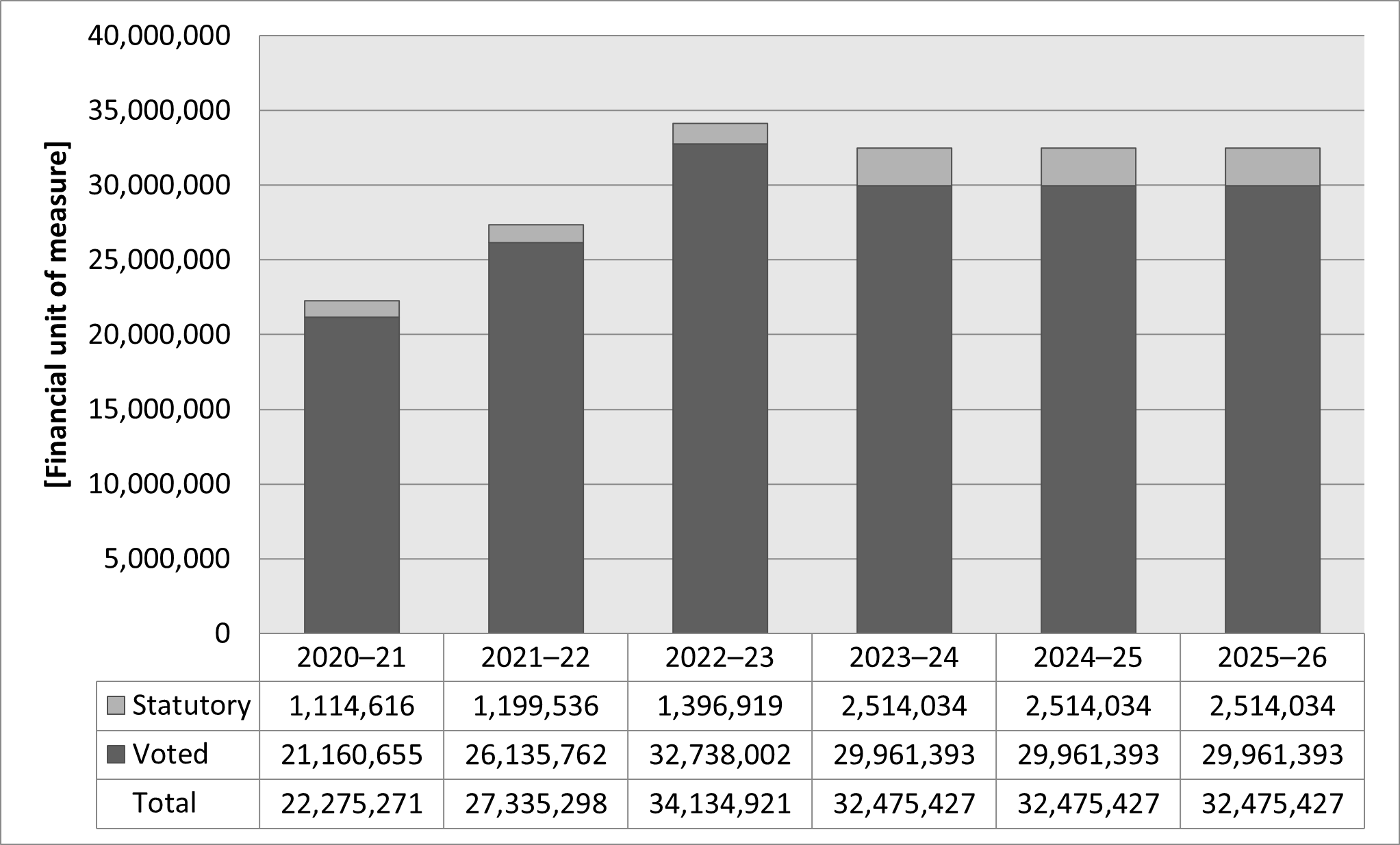
The rise in overall expenditures between the fiscal years 2020-21 and 2022-23 is predominantly driven by an increase in funding to support the transfer of custodianship of the Canadian High Arctic Research Station.
Budgetary performance summary for core responsibilities and internal services (dollars)
The "Budgetary performance summary for core responsibilities and internal services" table presents the budgetary financial resources allocated for Polar Knowledge Canada's core responsibilities and for internal services.
| Core responsibilities and internal services | 2022–23 Main Estimates | 2022–23 planned spending | 2023–24 planned spending | 2024–25 planned spending | 2022–23 total authorities available for use | 2020–21 actual spending (authorities used) | 2021–22 actual spending (authorities used) | 2022–23 actual spending (authorities used) |
|---|---|---|---|---|---|---|---|---|
| Polar Science and Knowledge | 16,920,422 | 16,920,422 | 15,836,430 | 15,836,430 | 17,357,853 | 9,377,632 | 13,810,911 | 15,615,192 |
| Internal services | 15,445,717 | 15,445,717 | 16,638,997 | 16,638,997 | 19,206,060 | 12,897,639 | 13,524,387 | 18,519,729 |
| Total | 32,366,139 | 32,366,139 | 32,475,427 | 32,475,427 | 36,563,913 | 22,275,271 | 27,335,298 | 34,134,921 |
Planned spending is expected to increase slightly in 2023-24 and 2024-25 due to increased baseline funding to support the operations of the Canadian High Arctic Research Station.
Human resources
The "Human resources summary for core responsibilities and internal services" table presents the full-time equivalents (FTEs) allocated to each of Polar Knowledge Canada's core responsibilities and to internal services.
Human resources summary for core responsibilities and internal services
| Core responsibilities and internal services | 2020–21 actual full-time equivalents | 2021–22 actual full-time equivalents | 2022–23 planned full-time equivalents | 2022–23 actual full-time equivalents | 2023–24 planned full-time equivalents | 2024–25 planned full-time equivalents |
|---|---|---|---|---|---|---|
| Science and Knowledge | 36 | 37 | 31 | 40 | 44 | 61 |
| Internal services | 42 | 42 | 41 | 50 | 51 | 59 |
| Total | 78 | 79 | 72 | 90 | 95 | 120 |
While the full-time equivalent (FTE) figures for programs and internal services remained relatively stable from 2019 to 2022, there has been a noticeable increase for both categories from the fiscal year 2021-22 to 2022-23. This increase is primarily attributed to the surge in research activities conducted at the Canadian High Arctic Research Station and the strengthening of internal services.
Expenditures by vote
For information on Polar Knowledge Canada's organizational voted and statutory expenditures, consult the Public Accounts of Canada.vi
Government of Canada spending and activities
Information on the alignment of Polar Knowledge Canada's spending with Government of Canada's spending and activities is available in GC InfoBase.vii
Financial statements and financial statements highlights
Financial statements
Polar Knowledge Canada's financial statements (unaudited) for the year ended March 31, 2023, are available on the department's website.viii
Financial statement highlights
Condensed Statement of Operations (unaudited) for the year ended March 31, 2023 (dollars)
| Financial information | 2022–23 planned results | 2022–23 actual results | 2021–22 actual results | Difference (2022–23 actual results minus2022–23 planned results) | Difference (2022–23 actual results minus2021–22 actual results) |
|---|---|---|---|---|---|
| Total expenses | 35,903,554 | 34,578,219 | 27,434,483 | (1,325,335) | 7,143,736 |
| Total revenues | 287,079 | 331,779 | 276,469 | 44,700 | 55,310 |
| Net cost of operations before government funding and transfers | 35,616,475 | 34,246,440 | 27,158,014 | (1,370,035) | 7,088,426 |
In 2022-23, the total authorities available for use were $4.2 million higher compared to the planned spending of $36.6 million mainly due to incremental, one-time funding approved during the year such as the operating budget carry forward and a reprofile from previous year funding.
The 2022–23 planned results information is provided in Polar Knowledge Canada's Future-Oriented Statement of Operations and Notes 2022–23.ix
Condensed Statement of Financial Position (unaudited) as of March 31, 2023 (dollars)
| Financial information | 2022–23 | 2021–22 | Difference (2022–23 minus 2021–22) |
|---|---|---|---|
| Total net liabilities | 7,314,782 | 3,545,968 | 3,768,814 |
| Total net financial assets | 7,035,112 | 3,058,137 | 3,976,975 |
| Departmental net debt | 279,670 | 487,831 | (280,161) |
| Total non-financial assets | 153,634,045 | 1,740,394 | 151,893.651 |
| Departmental net financial position | 153,354,375 | 1,252,563 | 152,101,812 |
Overall, from 2021-22 to 2022-23, the Departmental net financial position increased by $152.1 million. This is mainly due to the transfer of custodianship of the Canadian High Arctic Research Station and other capital assets transferred from Crown-Indigenous Relations and Northern Affairs Canada to Polar Knowledge Canada.
The 2022–23 planned results information is provided in Polar Knowledge Canada's Future-Oriented Statement of Operations and Notes 2022–23.x
Corporate information
Organizational profile
Appropriate minister[s]: The Honourable Dan Vandal, P.C., M.P.
Institutional head: Jennifer C. Hubbard, President and Chief Executive Officer
Ministerial portfolio: Minister of Northern Affairs
Enabling instrument[s]: Canadian High Arctic Research Station Actxi
Year of incorporation / commencement: 2015
Other: Polar Knowledge Canada is overseen by a nine-member Board of Directors, including a Chairperson and Vice-Chairperson. The Board approves the Agency's science and technology plan and annual work plans and budget. The Board is accountable to the Minister of Northern Affairs. All members are appointed by Order-in-Council to hold office for terms not exceeding five years and are eligible for re-appointment for a second term of office. Members of the Board of Directors hold office on a part-time basis.
Raison d'être, mandate and role: who we are and what we do
"Raison d'être, mandate and role: who we are and what we do" is available on Polar Knowledge Canada's website.
For more information on the department's organizational mandate letter commitments, see the Minister's mandate letter.
Operating context
Information on the operating context is available on Polar Knowledge Canada's website.xiii
Reporting framework
Polar Knowledge Canada's departmental results framework and program inventory of record for 2022–23 are shown below.
Internal services
| Departmental Result | Indicator |
|---|---|
| Departmental Result #1 - Canada's polar science and technology research is publicly available and being applied | Indicator 1 - Percentage of research publications led or supported by Polar Knowledge Canada that are available online to the Canadian public |
| Indicator 2 - Number of citations of research led or supported by Polar Knowledge Canada | |
| Departmental Result #2 - Canada's Arctic science includes Indigenous and local knowledge | Indicator 1 - Percentage of Arctic research projects led or supported by Polar Knowledge Canada that include Indigenous or local knowledge |
| Indicator 2 - Percentage of Arctic projects led or supported by Polar Knowledge Canada that involve Northerners | |
| Departmental Result #3 - Canada fosters domestic and international knowledge exchange and partnerships in polar science | Indicator 1 - Number of knowledge exchange activities or initiatives led or supported by Polar Knowledge Canada |
| Indicator 2 - Percentage of leveraged investment by Polar Knowledge Canada-supported projects | |
| Indicator 3 - Percentage of projects led by Polar Knowledge Canada that involve external partners | |
| Departmental Result #4 - The next generation of Canadian polar researchers is developed | Indicator 1 - Percentage of Polar Knowledge Canada-led or supported projects that involve youth or early career researchers |
Program Inventory
- Program: Science and Technology
- Program: Knowledge Management and Engagement
Supporting information on the program inventory
Financial, human resources and performance information for Polar Knowledge Canada's program inventory is available in GC InfoBase.
Supplementary information tables
The following supplementary information tables are available on Polar Knowledge Canada's website:xv
- Reporting on Green Procurement
- Details on transfer payment programs
- Gender-based analysis plus
- Horizontal initiatives
- Up front multi year funding
- United Nations 2030 Agenda and the Sustainable Development Goals
Federal tax expenditures
The tax system can be used to achieve public policy objectives through the application of special measures such as low tax rates, exemptions, deductions, deferrals and credits. The Department of Finance Canada publishes cost estimates and projections for these measures each year in the Report on Federal Tax Expenditures.xvi This report also provides detailed background information on tax expenditures, including descriptions, objectives, historical information and references to related federal spending programs as well as evaluations and GBA Plus of tax expenditures.
Organizational contact information
Headquarters
Mailing address: Polar Knowledge Canada – Canadian High Arctic Research Station, 1 Uvajuq Road, P.O. Box 2150, Cambridge Bay, NU, X0B 0C0
Telephone: (867) 983-7425
Ottawa Office
Mailing address: Polar Knowledge Canada, 170 Laurier Avenue West, Suite 200, Ottawa, ON, K1P 5V5
Telephone: (613) 943-8605
Email: info@polar-polaire.gc.ca
Website(s): https://www.canada.ca/en/polar-knowledge.html
Appendix: definitions
appropriation (crédit)
appropriation (crédit)
budgetary expenditures (dépenses budgétaires)
Operating and capital expenditures; transfer payments to other levels of government, organizations or individuals; and payments to Crown corporations.
core responsibility (responsabilité essentielle)
An enduring function or role performed by a department. The intentions of the department with respect to a core responsibility are reflected in one or more related departmental results that the department seeks to contribute to or influence.
Departmental Plan (plan ministériel)
A report on the plans and expected performance of an appropriated department over a 3-year period. Departmental Plans are usually tabled in Parliament each spring.
departmental priority (priorité)
A plan or project that a department has chosen to focus and report on during the planning period. Priorities represent the things that are most important or what must be done first to support the achievement of the desired departmental results.
departmental result (résultat ministériel)
A consequence or outcome that a department seeks to achieve. A departmental result is often outside departments' immediate control, but it should be influenced by program-level outcomes.
departmental result indicator (indicateur de résultat ministériel)
A quantitative measure of progress on a departmental result.
departmental results framework (cadre ministériel des résultats)
A framework that connects the department's core responsibilities to its departmental results and departmental result indicators.
Departmental Results Report (rapport sur les résultats ministériels)
A report on a department's actual accomplishments against the plans, priorities and expected results set out in the corresponding Departmental Plan.
full-time equivalent (équivalent temps plein)
A measure of the extent to which an employee represents a full person-year charge against a departmental budget. For a particular position, the full-time equivalent figure is the ratio of number of hours the person actually works divided by the standard number of hours set out in the person's collective agreement.
gender-based analysis plus (GBA Plus) (analyse comparative entre les sexes plus [ACS Plus])
An analytical tool used to support the development of responsive and inclusive policies, programs and other initiatives; and understand how factors such as sex, race, national and ethnic origin, Indigenous origin or identity, age, sexual orientation, socio-economic conditions, geography, culture and disability, impact experiences and outcomes, and can affect access to and experience of government programs.
government-wide priorities (priorités pangouvernementales)
For the purpose of the 2022–23 Departmental Results Report, government-wide priorities are the high-level themes outlining the government's agenda in the November 23, 2021, Speech from the Throne: building a healthier today and tomorrow; growing a more resilient economy; bolder climate action; fighter harder for safer communities; standing up for diversity and inclusion; moving faster on the path to reconciliation; and fighting for a secure, just and equitable world.
horizontal initiative (initiative horizontale)
An initiative where two or more federal organizations are given funding to pursue a shared outcome, often linked to a government priority.
non-budgetary expenditures (dépenses non budgétaires)
Net outlays and receipts related to loans, investments and advances, which change the composition of the financial assets of the Government of Canada.
performance (rendement)
What an organization did with its resources to achieve its results, how well those results compare to what the organization intended to achieve, and how well lessons learned have been identified.
performance indicator (indicateur de rendement)
A qualitative or quantitative means of measuring an output or outcome, with the intention of gauging the performance of an organization, program, policy or initiative respecting expected results.
performance reporting (production de rapports sur le rendement)
The process of communicating evidence-based performance information. Performance reporting supports decision making, accountability and transparency.
plan (plan)
The articulation of strategic choices, which provides information on how an organization intends to achieve its priorities and associated results. Generally, a plan will explain the logic behind the strategies chosen and tend to focus on actions that lead to the expected result.
planned spending (dépenses prévues)
For Departmental Plans and Departmental Results Reports, planned spending refers to those amounts presented in Main Estimates.
A department is expected to be aware of the authorities that it has sought and received. The determination of planned spending is a departmental responsibility, and departments must be able to defend the expenditure and accrual numbers presented in their Departmental Plans and Departmental Results Reports.
program (programme)
Individual or groups of services, activities or combinations thereof that are managed together within the department and focus on a specific set of outputs, outcomes or service levels.
program inventory (répertoire des programmes)
Identifies all the department's programs and describes how resources are organized to contribute to the department's core responsibilities and results.
result (résultat)
A consequence attributed, in part, to an organization, policy, program or initiative. Results are not within the control of a single organization, policy, program or initiative; instead they are within the area of the organization's influence.
Indigenous business (enterprise autochtones)
For the purpose of the Directive on the Management of Procurement Appendix E: Mandatory Procedures for Contracts Awarded to Indigenous Businesses and the Government of Canada's commitment that a mandatory minimum target of 5% of the total value of contracts is awarded to Indigenous businesses, an organization that meets the definition and requirements as defined by the Indigenous Business Directory.
statutory expenditures (dépenses législatives)
Expenditures that Parliament has approved through legislation other than appropriation acts. The legislation sets out the purpose of the expenditures and the terms and conditions under which they may be made.
target (cible)
A measurable performance or success level that an organization, program or initiative plans to achieve within a specified time period. Targets can be either quantitative or qualitative.
voted expenditures (dépenses votées)
Expenditures that Parliament approves annually through an appropriation act. The vote wording becomes the governing conditions under which these expenditures may be made.
Endnotes
_________________________
- GC InfoBase, https://www.tbs-sct.gc.ca/ems-sgd/edb-bdd/index-eng.html#start
- GC InfoBase, https://www.tbs-sct.gc.ca/ems-sgd/edb-bdd/index-eng.html#start
- GC InfoBase, https://www.tbs-sct.gc.ca/ems-sgd/edb-bdd/index-eng.html#start
- Indigenous Business Directory, https://www.sac-isc.gc.ca/eng/1100100033057/1610797769658
- IProcurement Strategy for Aboriginal Business, https://www.sac-isc.gc.ca/eng/1354798736570/1610985991318
- Public Accounts of Canada, http://www.tpsgc-pwgsc.gc.ca/recgen/cpc-pac/index-eng.html
- GC InfoBase, https://www.tbs-sct.gc.ca/ems-sgd/edb-bdd/index-eng.html#start
- Polar Knowledge Canada, https://www.canada.ca/en/polar-knowledge.html
- Polar Knowledge Canada's Future-Oriented Statement of Operations and Notes 2022–23, https://www.canada.ca/en/polar-knowledge/reports/departmental-plans/2022-2023/future-oriented-statement-of-operations-2022-2023.html
- Polar Knowledge Canada's Future-Oriented Statement of Operations and Notes 2022–23, https://www.canada.ca/en/polar-knowledge/reports/departmental-plans/2022-2023/future-oriented-statement-of-operations-2022-2023.html
- Canadian High Arctic Research Station Act, https://laws-lois.justice.gc.ca/eng/acts/C-17.8/page-1.html
- Polar Knowledge Canada, https://www.canada.ca/en/polar-knowledge.html
- Polar Knowledge Canada, https://www.canada.ca/en/polar-knowledge.html
- GC InfoBase, https://www.tbs-sct.gc.ca/ems-sgd/edb-bdd/index-eng.html#start
- Polar Knowledge Canada, https://www.canada.ca/en/polar-knowledge.html
- Report on Federal Tax Expenditures, https://www.canada.ca/en/department-finance/services/publications/federal-tax-expenditures.html
